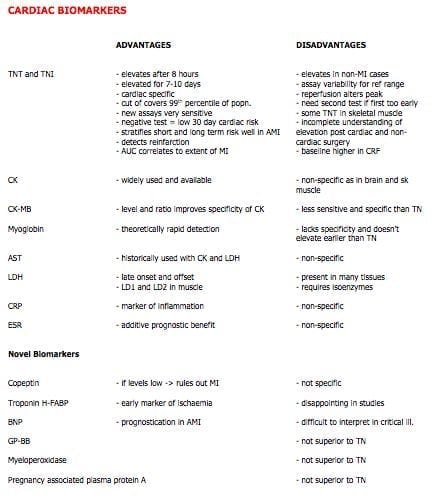Cardiac Biomarkers
OVERVIEW
- Biomarkers can potentially be used to detect and monitor a wide range of cardiac conditions in the critical care setting
- currently the only biomarker acceptable for changing management in acute coronary syndrome is the troponin test
- in the future, a tailored multi-marker approach may have use in guiding diagnosis and therapy – this is a long way off!
POTENTIAL USES OF CARDIAC BIOMARKERS
Myocardial ischaemia
- Troponin
- H-FABP
- ischaemic modified albumin
Thrombosis
- CRP
- ESR
- different binding proteins
Myocardial injury
- Troponin (level peaks at 12h, proportional to infarct size, but altered by washout phenomenom after reperfusion therapy)
- CK
- CK-MB
- myoglobin
- AST
- LDH
- novel: copeptin (C-terminal provasopressin), BNP/ NTproBNP, GP-BB, myleoperoxidase, pregnancy associated plasma protein A
Inflammation, endothelial activation and neutrophilic activation
- CRP
- ESR
- PaPPA
- endothelin/ CTproET-1
- adrenomedullin/ MRproADM
- myeloperoxidase
- matrix metalloproteinases (MMP9, MMP2, TIMP1)
Heart failure
- BNP/ NTproBNP
- ANP/ N-ANP/ MRproANP
- Troponin
- IL18
- CA125
- Urocortin
Sepsis-induced myocardial dysfunction
- Troponin
- BNP/ NTproBNP
Right ventricular strain in pulmonary embolism
- Troponin
- BNP/ NTproBNP
PROS AND CONS OF BIOMARKERS IN ACUTE MYOCARDIAL INFARCTION
References and Links
- Chan D, Ng LL. Biomarkers in acute myocardial infarction. BMC Med. 2010 Jun 7;8:34. doi: 10.1186/1741-7015-8-34. PMC2898678.
- McLean AS, Huang SJ, Salter M. Bench-to-bedside review: the value of cardiac biomarkers in the intensive care patient. Crit Care. 2008;12(3):215. PMC2481437.
- van Kimmenade RR, Januzzi JL Jr. Emerging biomarkers in heart failure. Clin Chem. 2012 Jan;58(1):127-38. PMID: 22086968. [Free Fulltext]

Critical Care
Compendium
Chris is an Intensivist and ECMO specialist at The Alfred ICU, where he is Deputy Director (Education). He is a Clinical Adjunct Associate Professor at Monash University, the Lead for the Clinician Educator Incubator programme, and a CICM First Part Examiner.
He is an internationally recognised Clinician Educator with a passion for helping clinicians learn and for improving the clinical performance of individuals and collectives. He was one of the founders of the FOAM movement (Free Open-Access Medical education) has been recognised for his contributions to education with awards from ANZICS, ANZAHPE, and ACEM.
His one great achievement is being the father of three amazing children.
On Bluesky, he is @precordialthump.bsky.social and on the site that Elon has screwed up, he is @precordialthump.
| INTENSIVE | RAGE | Resuscitology | SMACC

